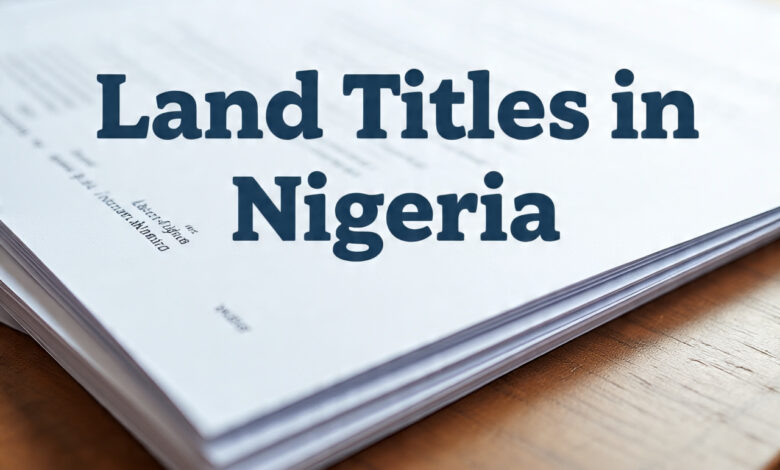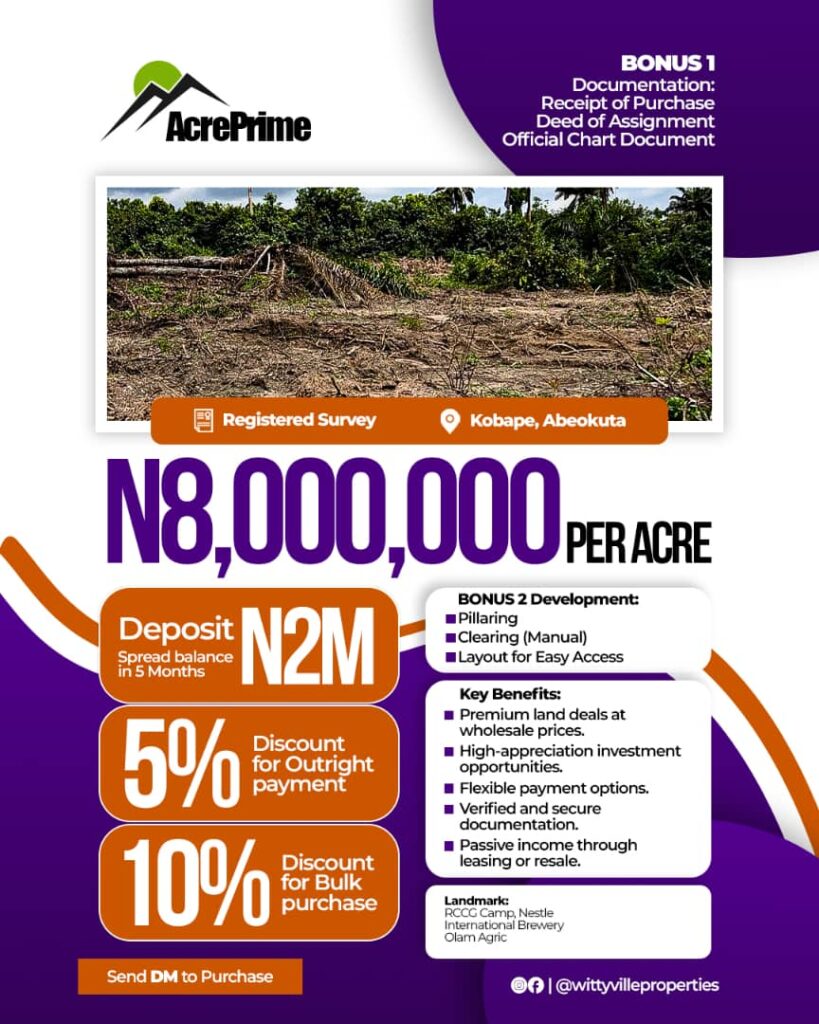Land Titles in Nigeria: Types, Importance, and How to Verify Them

Introduction
Land titles in Nigeria play a critical role in real estate ownership and security. Whether you’re buying your first plot of land or investing in large parcels, understanding the different types of land titles in Nigeria can protect you from fraud, legal battles, and financial loss.
In this detailed guide, you’ll learn about the various land titles, their legal significance, how to verify them, and what each one means for you as a buyer or investor.
What Is a Land Title?
A land title is a legal document that proves ownership of a parcel of land. It details the rights of the holder over the land and serves as official recognition by the government. Without a proper land title, you risk losing your claim to the property or facing legal disputes over ownership.
Why Land Titles in Nigeria Matter
Land ownership in Nigeria is governed by the Land Use Act of 1978, which vests all land in each state in the hands of the Governor. This means that holding a valid land title is essential to proving your right to occupy or develop any land. Additionally, a recognized title increases a property’s value and facilitates smooth transactions, financing, and development permits.
Types of Land Titles in Nigeria
Here are the most common types of land titles in Nigeria you need to know:
1. Certificate of Occupancy (C of O)
This is the most recognized land title in Nigeria. Issued by the State Government, a Certificate of Occupancy certifies the right of an individual or corporate body to occupy a piece of land for 99 years.
The government typically allocates it to individuals or developers for lands that have not had any prior ownership.
Key Facts:
- Legal proof of ownership from the government
- Necessary for land resale, mortgages, or development
- The government can revoke it under specific circumstances.
2. Right of Occupancy (R of O)
Granted under the Land Use Act, the Right of Occupancy gives individuals the legal right to occupy and use land for a specific purpose. It can be granted by the State or Local Government.
Key Facts:
- Valid for a term (usually 99 years)
- Not as comprehensive as a C of O
- Often issued in rural areas or for agricultural purposes
3. Government Gazette
This is a public record where government-acquired land that has been excised (released to indigenous communities or individuals) is documented. If a land is listed in the Gazette, it means it is now legally free from government acquisition.
Key Facts:
- Proves land is no longer under government acquisition
- Ideal for community lands
- Still requires further documentation like C of O
- on-in-process land without professional advice
4. Governor’s Consent
Governor’s consent is an Integral Part of Land Title Perfection. Although not a title in the same category as a C of O or R of O, Governor’s Consent is legally required for any transfer (assignment, sublease, mortgage, sale) of land that already has an existing title. Without this consent, the transaction is incomplete and voidable under Nigerian law.
It is considered the first stage of title perfection before stamping and formal registration can occur.
5. Registered Survey Plan
While this is NOT a recognized land title, the registered survey plan is a crucial legal document in any land transaction. It clearly defines the land’s boundaries and exact location, and is often a required prerequisite before you can apply for most land titles. Its role in verifying land claims, avoiding boundary disputes, and confirming land status makes it indispensable.
Key Facts:
- Needed before applying for most titles
- Helps prevent land disputes
- Should match government land records

How to Verify Land Titles in Nigeria
Verifying land titles is a necessary step before any purchase. Here’s how to go about it:
- Request All Available Documents: Ask the seller for copies of any land title documents.
- Conduct a Search at the Land Registry: Visit the State Land Registry to confirm the title’s authenticity and check for encumbrances or disputes.
- Hire a Legal Expert: A real estate lawyer can help you interpret documents and verify their legal status.
- Use Geographic Information Systems (GIS): Many states (like Lagos and Abuja) offer GIS services to verify land titles and boundaries.
- Check the Gazette (if applicable): Ensure the land is listed if it claims to be excised.
Common Land Title Scams to Avoid
- Buying lands with “family receipt” as sole proof
- Purchasing land labeled “excision in process” without legal backing
- Unregistered Deeds of Assignment
- Fake or cloned C of O documents
Conclusion
Understanding the types of land titles in Nigeria is essential for every buyer, developer, or investor. With the right title, you gain full legal backing, peace of mind, and the ability to grow your investment securely. Always ensure you verify every document, work with experts, and avoid shortcuts.
My book “Land Ownership”, breaks down what every buyer should know about land titles, verification, and legal steps to take . It’s a small investment that can save you from big mistakes. Click here to get a copy.




